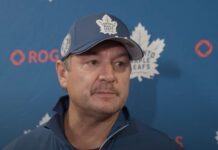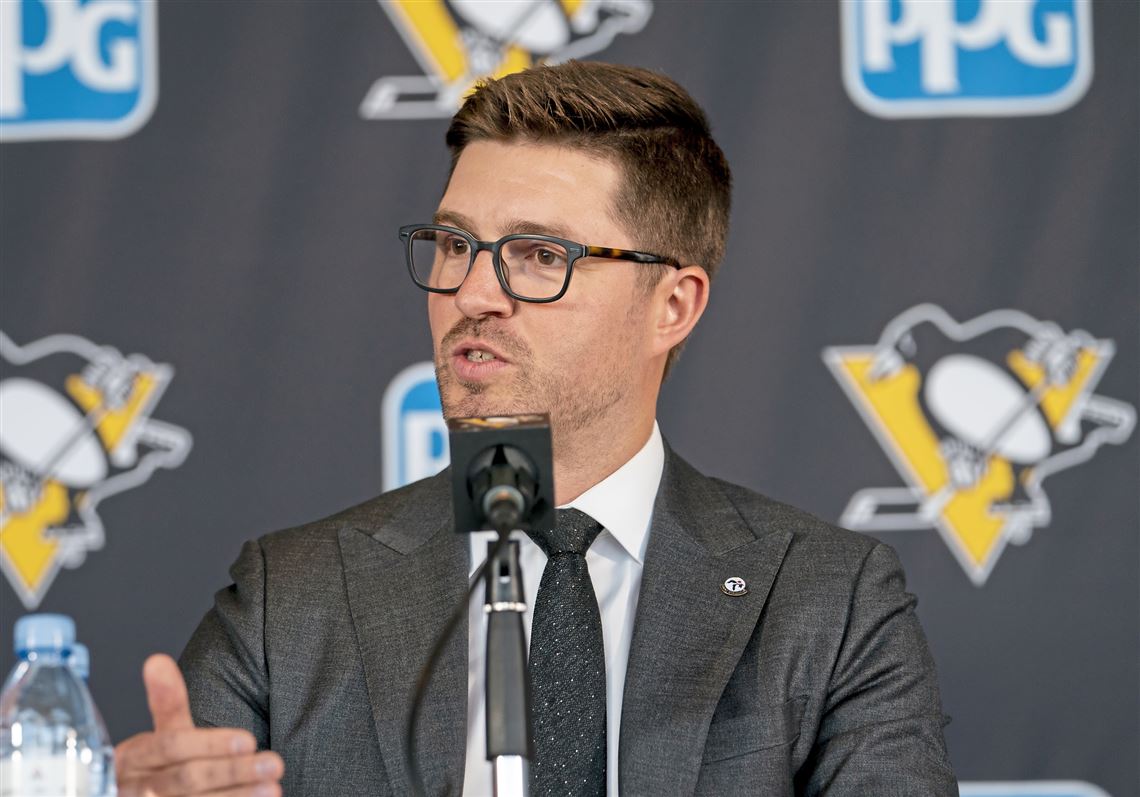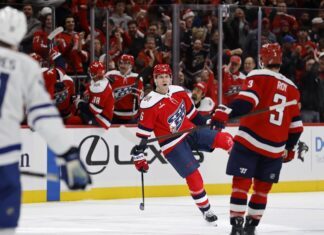In his introductory press conference as the new President of Hockey Operations of the Penguins, former Maple Leafs GM Kyle Dubas discussed his decision to move his family to Pittsburgh, his comments in his final press conference in Toronto, and his vision for the Penguins going forward.
Opening Statements
Dubas: I first wanted to take the opportunity to thank [the Penguins ownership] for the way they handled the entire process. We heard from them basically the next morning after my time in Toronto came to a close and began a process whereby it was very clear to our entire family that their commitment to winning and delivering a great team every single season — on and off the ice — in Pittsburgh was paramount to them and to the entire Fenway Sports Group.
When it comes to making us feel comfortable enough to make this move as a young family, all of the credit needs to go to Jennifer Bullano and Jason Seidling. Last week, they did an incredible job with my wife Shannon and our two kids, Leo and Lennon, of showing us around the city and making us feel comfortable in the city enough to the point where early this week, we made the decision that this was going to be the right move for us in the long term to make home and grow our family.
Every single thing that I have heard about the city of Pittsburgh and the people in Pittsburgh has been proven very true by our experience here in getting to know the staff that we have and being able to tour the city in the way that we have. There is a deep feeling of appreciation from our family to everybody who has made us feel very comfortable with this decision.
Through the course of this process, I had the chance to speak with Coach Sullivan and Sidney Crosby. I thought those were very important people for me to get a real deep sense of where they felt the organization was at and where it would be going so that I knew coming in where they felt the Penguins were at and what the Penguins would need from someone in this role.
A number of conversations with Coach Sullivan and also the conversation with Sid were paramount in my decision to come here. They are some of the best competitors in hockey. Obviously, Mike Sullivan’s record as a coach and Sidney’s as a player speak for themselves. That is one of the most exciting parts about coming here to Pittsburgh to work with the people who are with me here [at the press conference] but also every single person on the hockey operations side.
I see this task ahead of us as a two-pronged effort. In the short run, it is continuing to make decisions that will allow the group to be competitive while the core group of players that have led the group to championships in the past continues to perform at the levels that they have for as long as they can. We’ll make decisions that will support them in the lineup every night and will allow the team to continue to contend each season while those players are with us.
At the same time, the work will also begin toward delivering a long-term hockey organization that can be the class of the NHL and reducing any gap in time that there otherwise would be from the end of those great players’ careers to the next era of great hockey for the Pittsburgh Penguins.
That is our intention, and that is the work that we will get started on as soon as we wrap up here. We are very honoured to be here and to join the city of Pittsburgh and the Pittsburgh Penguins.
Kyle Dubas Q&A: “Maybe I was too honest that day about how I was feeling at that exact moment [in my final press conference in Toronto”
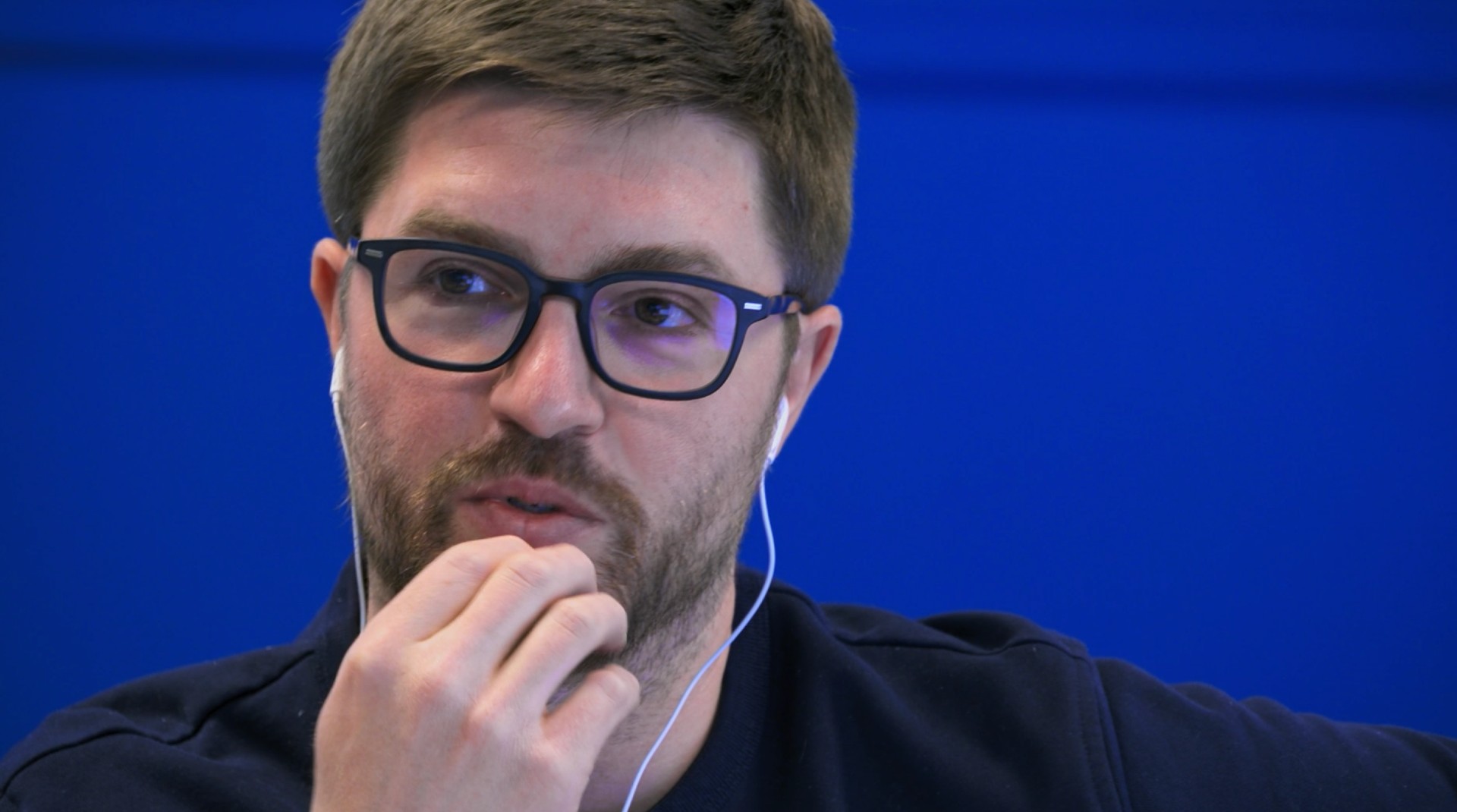
In your final press conference with Toronto, you expressed how difficult of a season it was on you and your family. Why was this the right opportunity?
Dubas: It was [difficult]. Maybe I was too honest that day about how I was feeling at that exact moment. But it is in the past.
When we came to the last day — Friday, the 19th — and got home the next day, we get inundated with calls and texts. People want to come over to the house. It is nice, but it is also sad.
Very early the next morning, I was on the phone with one of our staff there. I had a 647 area code call. It was a message from Sam [Kennedy] who told me that they had permission from Toronto. My initial inkling was that we needed to take a breath before we entertained other options. That was our intention at the beginning of the week.
My wife, later in the day, said, “I think you should go and at least meet with them. If they are great people, they have a long-term view of the organization, and it is going to be a great fit for you in terms of what everyone is about that you are going to work for and with, and the staff has a great feel, we are going to be moving anyway now.”
Our kids are going to be 6 and 2. Leo will be in Grade 1 next year. Shannon’s view was that if we are going to move, we might as well move now before the kids are too entrenched. That was a first step.
I had a really long meeting with Tom, John, Dave, and Sam at John’s home on the Sunday. From my view, it was just a remarkable meeting in terms of hearing the way that they view a sports organization, the way they want to build things out, and the short-term competitiveness but the long-range capacity to build an organization that can sustain success.
It was then having time with Sully and Sid to see what kind of people they are. I can look from afar and think I know them, but getting to know them was important to me as we went through it.
Really, the closer came in on Saturday and Sunday with Jenn and Jason and our family coming down. They really felt extraordinarily comfortable here. The other part of it on the family side — all of those boxes were checked in terms of the people I would be working for and with. The people I met in the organization are incredible. Everybody in the city that we interacted with was incredible.
Once Jenn and Jason were great with showing us around, we all became very comfortable with the idea. It wasn’t the intention going in, but seeing that we were going to have to move anyway, you never know — if you pass on this — is an opportunity to work with these people and for a city and group like this going to be available?
We jumped in today with both feet.
Will there be a GM underneath you? What are you looking for in that candidate? What kind of timeline are you on with it?
Dubas: I think the way I will handle that… Just in meeting with John, Tom, Dave, and Sam, it was very clear that the amount of work that they have done and how thorough they were in the search was fairly impressive to me. They have met with a lot of people.
With it being June 1st, it might be a little difficult to gain further permissions to meet with some of those candidates regarding a GM position. My intention is that I will handle that on an interim basis through to July, and then begin to go through candidates and make the decision that is best for the hockey department.
If we do go down that path, I think the type of person we will be looking for is someone who is progressive and can really add an element to the organization that perhaps I don’t have as a skill set in some regard.
Do you think the Penguins’ window to win a championship is still open? What areas need to be improved on to make that happen?
Dubas: The way I looked at this, in going through this decision from my end, is that I heard — in talking to people, once it started to circulate that it was a position we were considering after things wrapped in Toronto — a lot of people who were highly skeptical in the team’s ability to contend here. The way I view it: If people want to bet against Mike Sullivan, Sidney Crosby, Evgeni Malkin, Kris Letang, and others, they can go ahead and do so, but I am going to bet on them and go with them here.
I think it is a group capable of contending to win a championship. I do think that we need to build out the depth of the group and supplement the greatness that those people bring each day. I think there are some of those pieces that are already here, but in the next several weeks, we will get into work on more of that at the same time and really have a huge amount of focus on the long-term as well.
In your conversations with Sidney Crosby, what did you need or want to hear from him before accepting this job?
Dubas: What I wanted to be able to have a discussion with Sidney about is where he felt the team was at, but more than anything, it was to be able to sit with him and ensure that winning was the number one thing for him. It was very evident in talking to him that winning is his major focus every day.
When you have people like that who are constructed in such a way that winning — and the competitiveness/desire it takes to execute each day — [is everything], I think it can reduce the gap between the end of those players’ careers and the next era of great hockey here. It lifts the whole group and it lifts the whole standard.
If we can do good work on the long-term building while those players and the coaching staff are still… I mean, Sully can coach forever. He is a great coach. There is no real expiration date on Mike. On the players, everyone looks at it and says their age is what it is, so how much longer does the group here have? When I talk to Sidney Crosby, it was very clear that his only intention and desire is to win.
That is what I want to hear because I think that can have a massive impact on raising the level of the players that come in behind as prospects or younger players we are able to acquire in the next stretch. [Crosby’s] character and that of the group can reduce the amount of time in the gap between what is now and what is next.
How hard will it be to affect real change with this roster given the age and the amount of No-Movement Clauses on the roster?
Dubas: Those are obviously very real situations. Everyone knows they exist. To me, it is about what we can add in terms of depth pieces and what we can add in terms of younger players, whether it is by trade or free-agent acquisition. That will be the real key that we will set our focus on.
In the next couple of weeks here, we will begin to get a temperature for what the value is of all of the players in the market and try to move this roster back to a point… The major focus is inside our division. That is the way I always look at things. Rather than try to stack ourselves up against all 31 other teams, let’s focus on our division and let’s focus on trying to win our division. We play the most games there. That is what is going to set our playoff seeding. We have to be inside the top three to lock ourselves in, and our goal is to win our division.
To me, it is going to be a hard look in goal. There are big decisions that need to be on defense both at the top of the defense group and in the depth. There are big decisions to be made up front — there are fewer decisions to be made but more of what you speak of in terms of the number of commitments there.
It is going to be taking these next several weeks to sort through that. I don’t know what the schedule is — I’ll do what Jenn tells me in terms of media commitments — but by the time we have our next session, whether that is at the draft or prior, I will probably have a much more clear and definitive answer for you rather than just high-level stuff like today.
There might be a decision to make in goal with pending UFA Tristan Jarry. How do you evaluate that situation? How much do you prioritize Jarry this offseason?
Dubas: What we will do here, having not been with Tristan every day, is that I will rely on Andy Chiodo, who is the goaltending coach, and Mike in terms of what he is all about as a person. I will probably try to take the chance to meet him myself and get to know him. It is a big decision for the club.
It is then going to be doing a very thorough evaluation of Tristan, where he stands in the marketplace, getting a real scope of who is going to be available — whether that is in free agency or trade — and then if Tristan is at the top of that mix — or in that mix — because he is familiar and you know him, we will try to establish a concept that can get done with him and his agent.
That is a big priority. Goaltending is vitally important. It is also difficult to project and predict. There is a lot of variance year-to-year in terms of performance.
That is the method that we will take here in the next 48-72 hours.
You’ve mentioned supplementing the core with depth. Is there a particular player style you will be looking for, whether it be players who are more possession-based or if they play a bit more of a gritty style of game?
Dubas: Sully and I have had a very brief discussion on this. The top end of the forward group is very, very good. If you look throughout the league, to have that group that is there — in whatever formation you want to place it in that night — it is going to be good.
You have Jake Guentzel and Crosby on one line. You have Malkin centering another. Wherever you want to put the other pieces around, you are going to have a group there. Do we need another piece at that level to really put us over the top? The team does have a very good opportunity with the salary cap this summer as well. There is about $20 million in space. Do we need a piece there to supplement?
What types of players do we want in the bottom half of the lineup that can deliver the game back to those top players in a good spot, so they aren’t hemmed in their own zone? Do they have utility, whether it is penalty kill and being able to drive the puck down the ice?
In the end, I think there is a deep alignment — which is another reason why I am here today — on the fact that those players are going to have to be super, super competitive, but they are also going to have to be good. Being able to find those types of players is going to be very important over the next stretch.
On defense, it is going to be about going through and determining what exactly we need or what some of the younger guys who played a little bit last year are capable of in terms of stepping up. There are decisions there as well.
That is how I see it in the next several weeks.
You are known as an analytics guy. How much does Kyle Dubas, as an executive, have to do with analytics? When you look at the organization, do you think some changes need to be made in that department or maybe some additions?
Dubas: I grew up in the locker room in Sault Ste. Marie and then in scouting and player development. I know that is the reputation, but what I came to deeply appreciate was that the data and the objective information can provide you with a lot of detail and insights that you can use to make better decisions.
I just met the staff here very briefly on my walk over to this. I don’t know the exact extent of the work that they are doing. They all have great reputations. If they need more staff added that add different elements, that is the route that we will go down. There have been discussions with Tom, John, Dave, and Sam about what the ownership group and the management group at Fenway Sports are willing to do here to help the organization.
It would probably be presumptuous of me to say exactly what we need. I know what we had in Toronto. I think the key on it is the integration of all of the departments. Data and analytics can help to serve player personnel, player development, and high performance in addition to systems, tactics, and whatever Sully and the coaching staff need.
It will be about trying to integrate them all. In Toronto, at the start, it was tough. There were walls or silos in between. I don’t know what exactly exists here. This is my first 15 minutes on the job. Once we get through that, the goal we will be looking for is to have a deeply collaborative group that works together and serves to work together. That is what we will try to expedite as quickly as possible.
What did the experience as the GM of the Soo Greyhounds mean to you given your ties there and how did those few years shape who you are as an executive and person?
Dubas: I am from Sault Ste. Marie. In growing up in Sault Ste. Marie, that was really my dream job. I didn’t look at it and say, “I want to be an NHL GM or President of Hockey Operations.” When I was growing up, I wanted to be the GM of the Soo Greyhounds probably the same way someone who grows up in Pittsburgh feels about the Pirates, Steelers, or Penguins.
That was my dream job. To be able to do it, I will always look back and reflect so fondly on it. Really, I grew up in the organization. I started working there when I was 11 years old. They offered me a scouting position when I was 17 — Dave Torrey, who was the GM at the time, did — and then I became the GM at 25.
I made a lot of mistakes every step of the way. What it really taught me was how to handle the pressures of the job. I am from Sault Ste. Marie, so every single place you go there, the team is everything in the city. The media scrutiny and pressure were high. The criticism was a lot, especially in the first season. It taught me how to deal with that, which I think served me well in my prior post.
It really formed everything about how I feel about hockey and what I think about hockey. You are continuing to always change that, but also in leadership and leading a group of people, there is how collaborative you want to be, how you want to treat everybody, and so on and so forth.
I could talk about Sault Ste. Marie and the Greyhounds forever, but looking back on it, it is hard to put into words how much it means other than that it means everything to me getting started on this path.
You have a draft coming up in four weeks and free agency after that. You can’t be that familiar with Pittsburgh’s personnel and organization. Who will you rely on to give you input on which players should be retained, what you need in free agency, and what draft prospects look like?
Dubas: It is the responsibility in this job — and especially because Pittsburgh was a Conference rival in my prior post — that I try to stay up-to-date both at the NHL and AHL level on every team. I have my feelings on the group that is here. I have my feelings on the free-agent class.
When it comes to who I will rely on here, I will obviously rely heavily on the coaching staff at both levels — the American league and the NHL levels — for their insights on the group. Just in going through this process the last few weeks, it has been clear to me that there is a very good group of people here in the background that people speak very highly of. As I have begun to see their work in the last few days, I think it will be very helpful for me in going through and forming that.
As it pertains to the draft, last week, the amateur scouts were here and preparing for that. It is a draft that I do have a fairly decent knowledge on. I will use the next four weeks to focus on the draft and free agency to make sure we are armed with the information we need to make the best decisions.
We will rely on every facet of the organization that is in place as well as perhaps elevate some other parts of the organization and the input that they can provide.

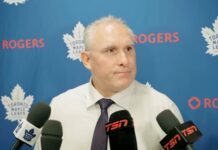


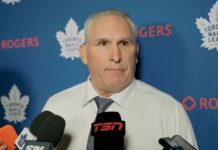

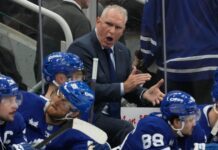




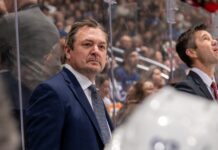



![John Gruden after the Leafs prospects’ 4-1 win over Montreal: “[Vyacheslav Peksa] looked really comfortable in the net… We wouldn’t have won without him” John Gruden, head coach of the Toronto Marlies](https://mapleleafshotstove.com/wp-content/uploads/2025/09/gruden-post-game-sep-14-218x150.jpg)

